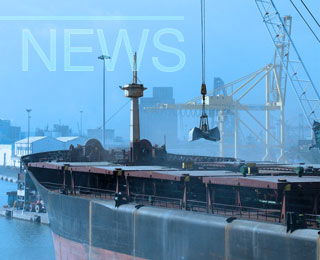This month is a round-up of global port news, beginning in India. Penna Cement has begun operations at its terminal and bagging plant at Cochin Port, Kerala. Marking an investment of US$8m, the terminal has a cement capacity of 0.3Mta. The first vessel to call at the new facility was the Penna Suraksha, a self-discharging cement carrier delivering 25,000t from Krishnapatnam Port, according to The Hindu newspaper. The vessel can discharge cement at up to 1000tph and is equipped with a shipunloader from IBAU Hamburg.
Meanwhile, Karaikal Port on the east coast of India has inaugurated its mechanised bulk cargo handling system. The state-of-the-art infrastructure for the mechanised system includes two stacker-reclaimers and a 5.7km belt conveyor system. The fully-automated bulk handling system improves the discharge of cargo from vessels using shipunloaders and dispatches cargo through wagon and truck loading stations using the 4000tph conveyor system. FLSmidth is among the companies that have been involved in the implementation, supply, integration and commissioning of equipment on this project.
Finally, Port Everglades in Florida has reported a two per cent YoY increase in bulk and breakbulk cargo tonnage, which is mostly made up of cement, steel and other building materials. The port also reached a record high of containerised cargo, marking a three per cent uptick YoY. Over the next five years the port is investing nearly US$1bn in infrastructure improvements to increase cargo volumes.
Proving that things do not always go to plan in port, the first week of November saw the 1976-built, 4117dwt cement carrier Fjordvik run aground while being piloted into the port of Helguvík in Iceland. The incident resulted in the hull being breached, causing an oil spill. All the crew were airlifted to safety.
